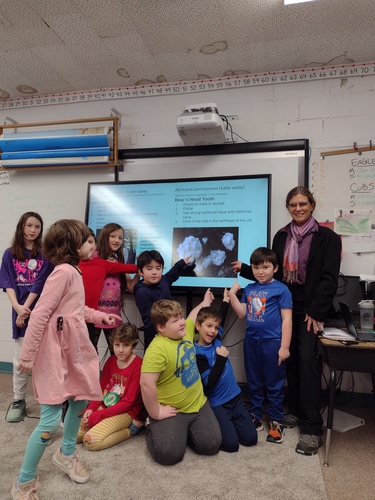WESTMINSTER —
Michelle Bos-Lun is a second-term member of the Vermont House of Representatives, co-representing the Windham-3 district, which includes her hometown of Westminster as well as Rockingham and Brookline. She is a secondary school teacher who also works with individuals experiencing homelessness. Last year, her photo in the "Happy Places" photography project that hung in the State House cafeteria showed her in the woods holding puffball mushrooms.
I recently submitted a bill after consultation with some important stakeholders: the elementary students of Windham Elementary School and the middle school students of the Compass School in Westminster.
The issue at hand?
Designating Hericium americanum, commonly known as bear's head tooth, as the Vermont State Mushroom.
Both groups of students spent time learning about wonders of wild mushrooms and, after considering diverse contenders, students at both schools chose the mushroom genus (Hericium, which means "hedgehog"), by a majority vote.
As part of the process, I visited both schools and talked with students about diverse mushrooms. We discussed pros and cons and symbolism from names and mushroom qualities.
At Windham, the lion's mane - another member of the Hericium genus - won, and the Compass School students chose the bear's head tooth, which won the majority of the votes across both schools.
* * *
Many educators agree that getting students into nature is a desirable physical and intellectual activity. Compass Science teacher Ron Bos-Lun (my husband) brings mushroom experts into the woods with his students to discover and identify fungi at Bald Hill Reserve in Westminster annually.
He also brought jack o'lantern mushrooms to both schools to let students observe mushrooms that glow in the dark. He said they found them "enchanting."
Students offered a range of reasons for why they thought bear's head tooth would be the best choice.
"A mushroom that grows in trees would be great, since Vermont has lots of trees," a younger student said.
The middle schoolers seemed more compelled by the mushroom's physical uniqueness as well as its medicinal qualities.
* * *
Almost anyone can learn about mushrooms, identify them, cultivate them, or harvest them in the wild. I began to explore the world of mushrooms during the rainy, isolating months of the pandemic.
First, I learned to identify lobsters, then chicken of the woods, then chanterelles. Suddenly a whole new world opened up! On almost every walk I took in the woods, I found new fungi - not all edible, but all interesting and beautiful in different ways.
I learned a new word - mycography, the photography of mushrooms - and delighted in capturing their images. My new hobby gave me a reason to go into the woods and linger and explore.
I want the same possibility for other Vermonters - especially children who study Vermont symbols in elementary and middle school.
* * *
Only five states have a state mushroom, though four others have had state mushrooms proposed. No other state has selected Hericium americanum as its official mushroom.
If the legislative committee assigned to review such matters decides to take up this bill, it will take testimony, including from the students who were involved in making the selection, from me as the lead sponsor of the bill, and from Vermont mycologists.
We could have a state mushroom by the end of the legislative session in May - just in time for thousands of foragers young and old to head into the woods to see if they can find bear's head tooth mushrooms and other fungi that have emerged!
I hope that selecting a state mushroom will boost interest in foraging and mycography and will inspire other Vermonters to head to the woods and see what delights they can find - or be inspired to take the easier option and buy mushrooms at farmers markets.
* * *
Do we have issues to decide this term that are more important, more complicated, than the Vermont State Mushroom?
Yes.
But it is important to remind Vermonters of the treasures we have in our woods. It's also important to let Vermont youth know that their voice matters and they can impact policy on the state level.
The process of adopting a state mushroom will stimulate interest and help Vermonters develop knowledge about mushrooms in the state - and perhaps encourage new people to go out in the woods looking not only for bear's head tooth but also the state bird (hermit thrush), the state animal (Morgan horse), or the state tree (sugar maple)!
The state mushroom bill sends a message that we value what kids think. It can empower youth voice and encourage people to spend time in nature. It can bring together legislators who might disagree about more complex issues, inspiring them to pull together to support nature and students.
Designating a state mushroom shows that we value our woods and what grows in them. It can motivate people to learn about and explore the world of fungi in Vermont, which acknowledges thousands of foragers and home cultivators who already are aware of how fantastic fungi can be.
Mushrooms can be exciting, nutritious, beautiful, and medicinal and are not a partisan issue. Foraging and identifying mushrooms is a hobby thousands of Vermonters young and old enjoy.
It's time for Hericium americanum to take its place as state mushroom. I am hoping the General Assembly can come together to establish a new symbol of Vermont, heeding the choice of some young, budding mycologists from our district to have Vermont become the sixth state with a state mushroom.
This Voices Legislative Update was submitted to The Commons.
